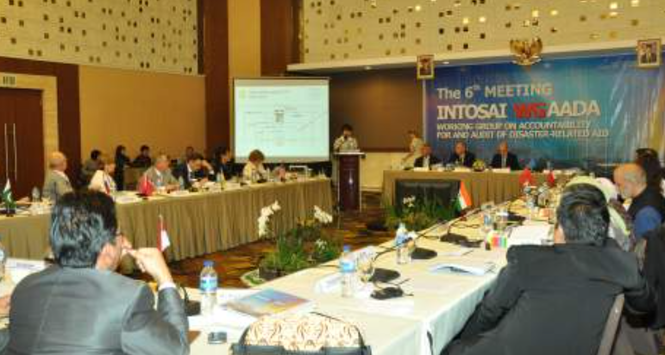
In view of the complexity of major disaster operations, the multitude of actors often involved, and the speed with which decisions need to be taken, it can be very challenging to ensure transparency and accountability as to the aid delivered. In order to address this, the International Organisation of Supreme Audit Organisations (INTOSAI) is currently developing an “Integrated Financial Accountability Framework” through a Working Group on Accountability for and the Audit of Disaster-related Aid (WG AADA). The Working Group convened for two days in Jogjakarta, Indonesia, in early June 2012 for a meeting attended by audit agencies from 14 member states, to encourage the use of the Integrated Financial Accountability Framework.
The Integrated Financial Accountability Framework (IFAF) is intended as a simple reporting framework for disaster-related and other humanitarian aid, to be implemented by all recipients and donors of humanitarian aid, which is designed to show from whom aid was received and how it was paid out over a given period of time. This initiative was formulated following the finding of the WG AADA’s predecessor, the INTOSAI Tsunami Task Force (set up in 2005 after the Indian Ocean tsunami), that information available on the volume of aid, the identity of donors and how funds were actually spent was sorely inadequate.
When asked whether the IFAF proposal would make disaster relief more complicated, Mr. Gijs de Vries, Member of the European Court of Auditors and chairman of the Working Group, affirmed: ”On the contrary! When IFAF is implemented, all stakeholders in humanitarian aid and the general public will be able to trace aid from donor to recipient.” He added that tests have shown that IFAF is “quite easy to implement.” The IFAF reporting format uses the same data as that used for drawing up the annual financial statements of the organisations. The format of the IFAF tables should be “simple and transparent and based on national accounting standards”.
Mr De Vries emphasized that “[i]n addition to providing information on aid flows that have taken place, harmonised reporting of disaster-related aid will reduce the administrative and audit burden for organisations donating, managing and receiving aid. The application of IFAF should result in fewer individual donor reporting requirements and greater use of pooled funding with the associated reduction in costs. Information on aid flows will be more straightforward and easy to follow.”
The 6th Working Group meeting in Jogjakarta examined four sets of draft guidance for Supreme Audit Institutions, which will be presented and approved at the INTOSAI Congress in Beijing, in October 2013. These cover the audit of disaster preparedness, the audit of disaster-related aid, guidance on taking account of the risks of fraud and corruption in the emergency phase of a disaster and the use of geospatial information. The disaster preparedness guidance provides best practice on auditing in the context of disaster risk reduction, prevention and mitigation. The guidance on auditing aid in post-disaster situations focuses on possible risks when procedures and controls might not function as normally expected. This includes delays in the collection and distribution of aid, issues of unintended recipients, funds, materials or aid which are not distributed to the beneficiaries, issues of unrecorded and damaged aid, and many more. The fraud and corruption guidance outlines risks and red flags of which auditors should be aware and provides advice on how to adapt audit procedures accordingly.
Mr. De Vries added that INTOSAI is currently piloting IFAF with donors and implementing organisations, including national governments, NGOs and UN bodies in order to familiarise them with the framework and support them with practical implementation issues. Mr De Vries hopes that more organisations will take part in the process, and invites “governments and organisations to test IFAF and contribute to its further development as a reporting tool in disaster-related and other humanitarian aid.”